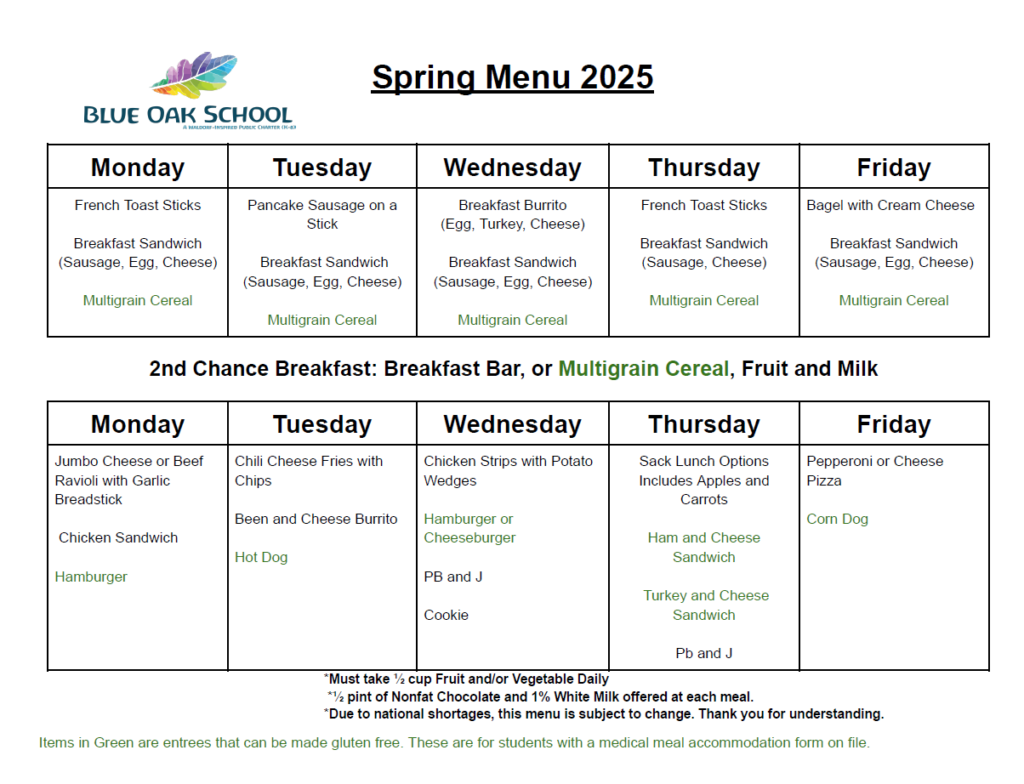Parent Resources
Nutrition Services

Class field trips are an important part of our curriculum. They strengthen connections and a sense of community in the classrooms; among the kids and the adults. We are continually working on improving the extensive process that goes into these field-trips. Here are some of the need to know requirements that are consistent for each and every field-trip:
- Permission Slips – All permission slips are to be signed an returned to the classroom teacher directly.
- Payments – All payments should be made at the front desk or on the website. Cash, Checks or Cards are accepted. To make a field trip contribution now, click on the Donations tab found under the sites main navigation.
- Live Scan Clearance, Driver’s License, and Auto Insurance – All drivers must have a fingerprint clearance on file, and a current License and Insurance on file with the front desk.
- Medications – The above “Authorization for Medication” form needs to be downloaded and completed or picked up at the front desk. Upon completion, this document needs to be dropped off at the front desk, sent to Kayla Mahanay (Health Aide), or emailed to info@blueoakcharterschool.org. For any questions regarding medication, please contact Kayla Mahanay (Health Aide) at kaylamahanay@blueoakcharterschool.org.
Thank you for your interest in raising funds to support Blue Oak! Please let us know how we can help you. All Fundraising activities must be approved by Administration in writing. Participants must comply with our fiscal procedures when collecting money on behalf of the school.
Fundraising activities are defined as any activity which involves collecting funds to benefit Blue Oak School.
Some examples:
- Classroom fundraising events; single or recurring
- All school fundraising events; single or recurring
- Online fundraisers such as Donors Choose, Go-Fund-Me, etc.
To submit your fundraising ideas please complete the “Fundraiser Application” found under the Forms and Resources section above and submit it to the front desk. Applicants will be contacted once their application has been processed.
Where will the money go?
We have identified 3 giving baskets. If you are hosting a fundraiser, you simply need to identify which basket you are raising money for.
1. Whole School > Annual Giving > Materials
2. Classrooms > Field Trip funds
3. Parent Council Fund > Waldorf specialties & special projects
If you are interested in making a donation yourself or would like to inform others how and where to make a donation, please visit our Donations page by visiting: https://blueoakcharterschool.org/donate/.
Now that our school board has voted to change our current COVID policy, all Blue Oak parents are allowed back on campus regardless of vaccination status. With this in mind, we’d like to welcome you back to campus with the following information.
How to Get Started:
- To volunteer on campus we require a Live Scan. To do so, pick up a Live Scan Form from the Front Desk and use the link below to find a Live Scan location near you. If you are unsure if you have completed a Live Scan for Blue Oak, please reach out to Alex Archer.
- To volunteer on a field trip we require a copy of your Driver’s License and a copy of your insurance as well as a Live Scan.
- On the day you arrive to campus to volunteer, please check in with the Front Desk to receive a volunteer badge.
Ways to Volunteer:
- Events (planning, setup, facilitating, cleanup)
- In the classroom – grade level or specialty (material prep, special lesson/celebration/showcase, etc.)
- Field trips (day trips, walking field trips, overnight field trips, etc.)
- Middle school dances (ticket sales, chaperones, setup/cleanup)
- Host a class or school-wide fundraiser (box dinners, bake sales, concession stand, photo booth, etc.)
- Parent Council and/or Garden Club
- Join our governing board or one of several committees
We are currently looking for parent volunteers to join our Charter Council, Finance Committee, Facilities Committee, and Parent Council.
The Importance of Volunteering:
A message from our Executive Director:
The single most important factor in the success of a child’s education is the parent. Volunteering in the classroom, at school events, or helping at home to support school needs shows your student their education is important to you. Children whose parents are involved in their schools do better in terms of grades, behavior, attendance, and testing.
Volunteering helps to build your relationship with your student’s teacher and school staff. Time in the classroom helps you better understand the daily routines and expectations and allows you to see your child in the school environment. It builds community; giving you a better opportunity to meet other parents and the students your child spends the day with.
If you choose to volunteer at Blue Oak, do not try to fill every need of the school. Be realistic, find the opportunity that works for you, and say no when you need to.
If you have a question or concern, take the following steps first for resolution or understanding:
1) First, bring your concerns/questions to the appropriate personnel such as your classroom teacher, specialty teacher, facility or front office staff.
2) If the concern was not resolved, then bring it to administration to schedule a meeting time for a discussion.
3) Your final option, is to bring your concerns/questions to the Board Chair or other board member, only after you have talked with your classroom teacher and Executive Director, to get a clear understanding of when/how your concern will be addressed. The Board Chair or other board member will communicate with the administrator and may ask that the item be placed on the agenda for open review. Or you can bring your concern/question to the open session of the board.
4) If the issue has not been resolved after steps 1-3 file a formal Uniform Complaint Form should be completed. The link to this form can be found above under Forms and Resources.
Screen time is both a cause and symptom of kids’ bad behavior, according to new research.
Updated Jun 9, 2025
PUBLISHED Jun 9, 2025, 9:00 AM ET
Analysis by Kara Alaimo
Does your child not listen to you? Do they kick and scream when they get angry? You may need to rethink their screen time, according to an article published Monday in Psychological Bulletin, a journal of the American Psychological Association.
The more time kids spent looking at a screen, the more likely their actions and feelings didn’t meet expectations for their stage of development, according to a meta-analysis of 117 studies of kids younger than 10½ when the research began.
These socioemotional problems included anxiety, depression, hyperactivity and aggression. The association was small but significant, especially for girls.
The studies were designed in different ways but the overall picture showed that trouble occurred when kids under age 2 had any screen time (other than video chats), when kids ages 2-5 had more than an hour per day of screen time and when older kids had more than 2 hours per day of screen time.
Kids who spent a lot of time on games were particularly at risk. And 6-to-10-year-olds were more likely to develop socioemotional problems than children age 5 or younger.
What’s more, kids who experienced these challenges tended to turn to screens even more to cope, which could exacerbate the problem. This was especially the case for boys.
“High screen use isn’t just a cause of problems — sometimes, it’s a symptom,” said lead author Roberta Pires Vasconcellos via email , noting one of the most striking findings.
“In many cases, children who are already struggling emotionally turn to screens, especially video games, as a way to cope or escape,” said Vasconcellos , who is an associate lecturer at the University of New South Wales in Sydney, Australia. “While that might offer short-term relief, over time it can trap them in a cycle that reinforces those emotional difficulties.”
One of the largest of its kind, the meta-analysis has limitations, however, because it couldn’t account for factors such as parenting style or socioeconomic status, Vasconcellos said. And since the studies looked at screen time more broadly, they couldn’t pinpoint the effects of social media use on kids’ mental health.
Nevertheless, this latest data on kids and screen time suggests specific actions parents or guardians can take to have a real, positive impact on their kids’ mental health.
Don’t use screens for childcare
Adults often give kids screens to help them calm down, especially during work time or in other situations when children need to be quiet, such as at a restaurant.
“While this may offer short-term relief, it can lead to longer-term problems,” Vasconcellos warned. That’s because it may prevent kids from learning how to behave appropriately and handle their emotions.
“Instead of developing self-regulation skills, they come to rely on screens for comfort and distraction,” she said. “This can reinforce a harmful cycle where emotional difficulties are masked rather than addressed, making it even harder for children to cope without a screen over time.”
Don’t let kids use screens to cope with their emotions
Look for signs that children are reaching for screens when they have a problem. Rather than assuming the problem is the screen itself, look at the bigger picture, Vasconcellos said.
“If you notice your child turning to screens more often when they’re upset or withdrawn, it might be time to check in on how they’re doing emotionally,” she advised. “In some cases, they might be seeking the sense of connection or support they’re not finding in their face-to-face relationships — at home, at school or in other social settings.”
That’s when they need parental support and guidance the most — “to help them feel heard, understood and emotionally safe, both online and offline,” Vasconcellos said.
School guidance counselors or therapists are also good sources of support.
Watch out for video games
Screens can keep children from engaging in real-life activities like sleep, schoolwork and other interactions in the real world.
Yulia Grossman/Moment RF/Getty Images
The amount of time kids spend gaming is also important to note, according to the study.
“Online games, in particular, pose additional risks because they often function like social media platforms,” Vasconcellos said. “Since these games continue even when a player logs out, children may feel pressure to stay connected for longer periods, which can lead them to neglect important real-life activities like sleep, schoolwork and face-to-face interactions.
“For this reason, gaming may require extra attention and clearer boundaries — especially for older children, who are typically granted more independence in how they use their time.”
Set rules and use parental controls
It’s important to set rules for kids’ screen time and stick to them. “Keeping rules consistent helps children know what to expect and makes limits easier to follow,” Vasconcellos said.
Parental controls on phones and apps are also useful. “Most devices offer built-in tools to help you manage screen time and filter content,” she said. “Use these settings to set reasonable daily limits and ensure your child is only accessing age-appropriate material.”
To help prevent kids from depending too much on devices, Vasconcellos suggests removing apps such as video streaming platforms that are particularly tempting. Instead, give kids content that is educational or that serves a good purpose.
It’s OK to say no to your kids
The results of this study didn’t surprise me. In my research, therapists and teachers often complain that parents or guardians aren’t willing to set limits and say no when their kids ask for screens.
When I say no to my own kids, their reactions aren’t always pleasant. I have to remind myself that, as their mom, it’s my job to know what’s best for them and to make decisions that will keep them healthy in the long run — even if it leads to short-term distress for us all.
Limiting kids’ phone use is also wise. A newly published consensus statement I coauthored with experts around the globe offers evidence that heavy use of social media and smartphones by young people is linked to problems with sleep, attention, addiction and body dissatisfaction.
You don’t need to be ‘fair’
When I speak to parents about how to handle their kids’ social media use, they often tell me they feel they need to give their younger kids a phone at the same age their older siblings got one. That’s not true.
Tell younger kids who make this argument that you are more experienced now and have more data showing how screen time can be harmful.
Also consider attractive alternatives to a phone. One mom told me she offered her daughter $1,600 to wait until she was 16 to get a phone. Her daughter took the cash. While many people don’t have that kind of disposable income, you can still be creative and propose other things that kids would like. Sleepovers with friends, or a family camping adventure are just some examples.
No matter what you offer, it’s important to rethink the way you let your kids use technology. Since screen time may be both a cause and a symptom of behavioral and emotional problems in children, get comfortable saying no. It may provoke kicking and screaming in the moment, but it will likely lead to better mental health in the long run.
ParentSquare
ParentSquare is a communication and organization tool designed to keep parents informed and involved in their children’s learning and school activities. It serves as our main messaging platform to distribute information out from our Blue Oak Teachers and Staff to our Blue Oak Parents. ParentSquare automatically generates an account for each parent, using their preferred email address and phone number when you are first enrolled.
We encourage all parents to set up their accounts, download the mobile app, and update their preferences on when and how they are notified. We promise to only send you information closely related to school. You can opt-out at any time.
With ParentSquare you can:
- Receive messages from the school via email, text or app notification
- Choose to receive information as it comes or all at once at 6pm daily
- Communicate in your preferred language
- Comment on school postings to engage in your school community
- Direct message teachers and staff
- Participate in group messages
- Sign up for parent-teacher conferences with smart online technology
- Receive report cards, sign up to volunteer and more all from your phone or web portal
- Log your Volunteer Hours monthly
- Share photos privately
If you are new to ParentSquare, have questions about how to use this platform, or want to learn more, please click on the link below:
Forms and Resources


Faculty Share Slideshows
For every Parent Council and Blue Oak Charter Council meeting, our faculty members compile a quick review of what our Blue Oak teachers have been working on in their classes over the past few weeks. Click on each icon to view the corresponding slideshows from the last few months:
